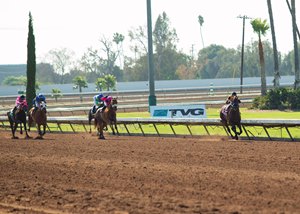CHRB Issues Half-Year Los Alamitos License With Review


During a contentious meeting of the California Horse Racing Board Dec. 17, regulators granted a license to Los Alamitos Race Course through the end of June rather than a standard full year. A determination on a continuation of the Orange County track's license for the second half of 2021 will not be determined until June when the board evaluates the track's equine safety record, regulators said.
The six commissioners that attended the virtual meeting—board member Alex Solis was absent—were originally deadlocked in a pair of motions that resulted in neither passing. Commissioners Wendy Mitchell and Brenda Davis joined Oscar Gonzales' motion to limit the Los Alamitos license to approximately six months, while chairman Dr. Greg Ferraro and commissioners Dennis Alfieri and Damascus Castellanos initially backed a full-year license with follow-up review.
Alfieri and Damascus Castellanos later supported the half-year license when it appeared that no motion authorizing a Los Alamitos license would pass. Ferraro remained opposed to the half-year license, saying, "Basically because I think we're making a mistake."
Earlier during the meeting, Los Alamitos submitted an equine safety plan that was approved that now states no horse can be entered in a Los Alamitos race after receiving an intra-articular injection within 14 days preceding the race, or within 30 days in the case of an injection of a corticosteroid. Horses are not permitted to race if they have received more than two intra-articular injections of a corticosteroid in the same intra-articular space within 60 days of racing.
These equine welfare changes were praised by commissioners following a high number of equine fatalities a Los Alamitos this year. A study by the CHRB indicated intra-articular injections occur at a higher rate there than at other major California tracks.
A state-high 28 equine fatalities have occurred at Los Alamitos this year from racing or training, according to CHRB statistics, mostly during the track's evening programs of Quarter Horses and lower-level Thoroughbreds. Los Alamitos also serves as a year-round training center and runs two short meets of better-quality Thoroughbreds during the afternoon. One of those afternoon meets is underway.
Prior to the final license vote, Los Alamitos owner Dr. Ed Allred threatened to withdraw his license application given the prospect of a half-year license. He said that sustained payments are necessary for the track's Quarter Horse futurities and any uncertainty could impact their business.
"If you're going to do it only for six months, people can't make preparations and plans, going forward," Allred said. "This is devastating to Los Alamitos. It will become a real estate development. I don't want that to happen."
Gonzales did not back down from his position and urged Allred to reconsider.
"If the kind of improvements continue, then racing continues at Los Alamitos, as will be the case at other racetracks," Gonzales said. "But I just don't feel that a racetrack that has not lived up to the expectations that we've set forth in reform—and a very serious-minded board—that we should allow for a carte blanch of racing dates without any conditions or stipulations."
Los Alamitos also came under criticism for some of its horses competing in unsanctioned match races off-site in the state during a public comment period by speakers opposed to racing.
Other individuals expressed their support for Los Alamitos, mentioning Allred and the track's efforts to sustain a Southern California Thoroughbred circuit after the closure of Hollywood Park and Fairplex Park during the past decade.
Also during the four-hour meeting, CHRB executive director Scott Chaney indicated that an appeal of a Dec. 9 decision by stewards to uphold Justify as the winner of the 2018 Santa Anita Derby (G1) would go before the board "whether to entertain that request" during a closed-door session at its next meeting Jan. 21. Justify and another Bob Baffert-trained horse, Hoppertunity , showed the presence of scopolamine, a prohibited substance, in their post-race samples following victories in April 2018, with Hoppertunity's win coming in the Tokyo City Cup Stakes (G3) at Santa Anita Park.
Neither horse was disqualified with the CHRB attributing both lab results to be caused by contamination linked to jimson weed.

In a separate matter during his opening remarks, Chaney cast doubt as to whether Golden Gate Fields would resume racing at the start of its upcoming scheduled meet Dec. 26. The track has been shuttered due to an outbreak of more than 300 cases of COVID-19 among workers at the Northern California track. Chaney said testing continues twice a week and "a resumption of racing is not a consideration at this point as the main focus is human and equine health."
Due to the Golden Gate shutdown last month, betting on California's daytime racing cards dropped more than 44% on 13 fewer programs compared to November of last year, Chaney said.
Also during the Thursday meeting, the CHRB approved motions that prohibit the use of Lasix in the overwhelming majority of Thoroughbred stakes in the state next year. Stakes races for California-breds, 4-year-olds and up, can be exempted with racing association and Thoroughbred Owners of California approval.
